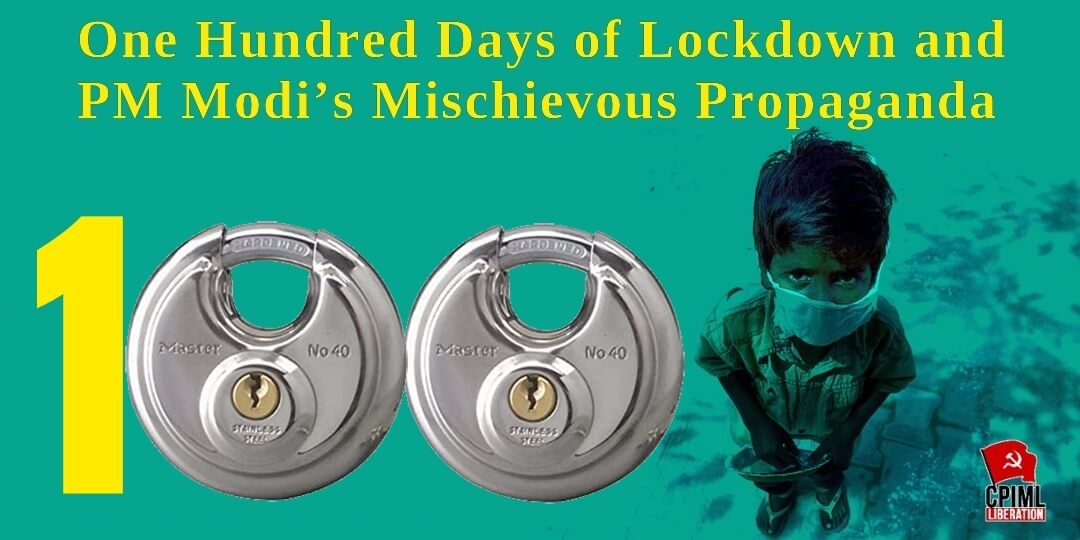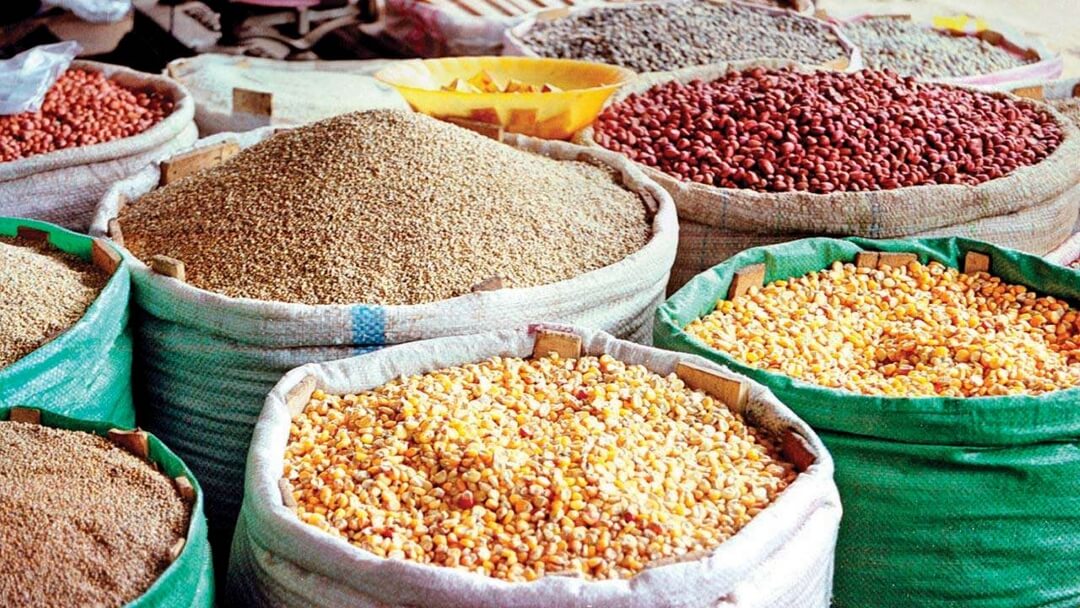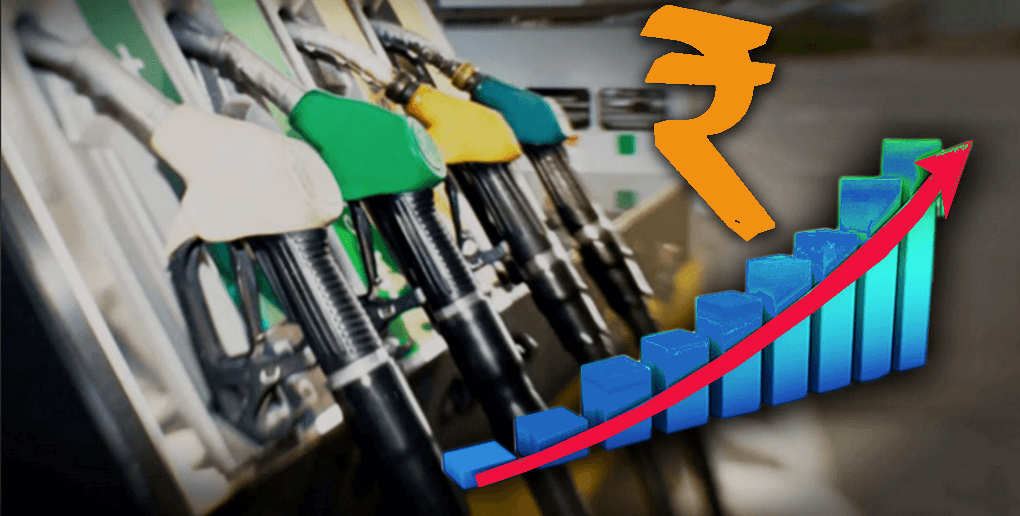One Hundred Days of Lockdown and PM Modi’s Mischievous Propaganda

ON the 98th day of lockdown, Prime Minister Narendra Modi addressded the nation yet again. This was his sixth ‘Corona special’ address since the outbreak of the pandemic. But like all his five previous addresses he said very little about the Covid19 situation in the country and absolutely nothing as to what his government is doing to tackle the pandemic. While addressing the people of his constituency Varanasi during the first phase of lockdown, he had compared the battle against Covid19 with the epic battle of Mahabharata. While the battle of Mahabharata was won in 18 days, the battle against Covid19 would be won in 21 days, the PM had solemnly declared.
Seventy seven days after the end of the 21-day deadline, India now ranks fourth in terms of Covid19 cases (fast closing in on Russia for the third slot) with close to six lakh cases and eighth in terms of death toll with more than seventeen thousand reported deaths. If the PM said anything about Covid19 it was only to remind citizens what they should do by way of precaution and habitual hygiene and to claim credit for the relatively less number of deaths by attributing it to the lockdown. It has become the common propaganda tactic of the government to claim success of the lockdown by pointing to India’s lower death toll in comparison to Europe and America. Nothing could be more deceitful.

Many experts have been telling us from the very beginning that fortunately the fatalities in India would be much less because of the greater immunity of average Indians in fighting flus and the lesser virulence of the virus strain in this part of the world. The government selectively chooses examples to claim greater statistical success for India. If we go by population, our figures are much worse than China, the world’s most populous country, which now ranks 22nd in terms of Covid-positive cases. If we compare our rates with our western and eastern neighbours, both Pakistan and Bangladesh have a significantly lower fatality rate (less than 2%) than India (3%). The fatality rates also vary widely within Europe – while Italy, Spain, France and UK are indeed in the highest 10-20% bracket, Germany has a fatality rate of below 5% and Russia way below 2%.
The fact that PM Modi has never admitted is that India has the worst lockdown report card. No other country in the world has had to deal with a lockdown-induced crisis of the kind and magnitude that India is still reeling under. No other country in the world has had to face an exodus of migrant workers like India did. And certainly no other country has experienced the tragedy of hundreds of totally avoidable lockdown-induced deaths. Modi just wants to brush everything under the carpet by pointing to India’s relatively low death toll. He wants us to thank his government and its absolutely cruel and utterly unplanned and mismanaged lockdown for India’s lower death toll compared to the top seven countries till now, viz., US, Brazil, UK, Italy, France, Spain and Mexico. This is nothing but using a pandemic for mischievous and deceitful propaganda.

The worst and most shocking bit of self-congratulatory propaganda in Modi’s June 30 address has been over what the government has named Pradhan Mantri Garib Kalyan Anna Yojana. Modi announced extension of the programme under which every family has been getting every month one kilogram pulse and five kilogram wheat or rice (the latter on per member basis) free of cost till end November. He described this scheme as something that has ‘surprised the whole world’, once again presenting the number of beneficiaries as multiples of population of smaller countries (over 2.5 times the population of the US, 12 times the population of the UK and double the population of the EU as the PM put it). The PM also declared that the extension had been done keeping the festive season in mind, mentioning for good measure Dewali and Chhath (Bihar is scheduled to go to the polls in October and November).
Since the beginning of the lockdown there has been an overwhelming demand for a lockdown package guaranteeing among other things, free ration of ten kg wheat/rice and other essential items and income support of Rs 7,500 through monthly cash transfer to all families below the income tax paying threshold. The government has only responded with this rather token offer of limited ration, which often means nothing in the absence of any cash flow to needy families, making it difficult for them to buy other essentials to cook meals. Incomes have dried up for millions of working class and poor families, forcing many of them to exhaust whatever little savings they had. The free ration can mean assistance worth at most INR 600-700 per family per month, which is just the daily income many of these families have lost under lockdown.

The PM thanked India’s farmers and honest taxpayers for enabling the government to run this free ration scheme. While the PM thanks the farmers, his government has refused to pay heed to any of the long-standing demands of India’s farmers. In fact the government has now begun to abdicate its very responsibility to guarantee procurement of crops at fair prices by effectively sabotaging and dismantling the state-specific APMC networks. And honest tax payers in India do not refer to the super rich who are not only hugely undertaxed but who have also mastered the art of tax theft by various means. It is again the common people who pay the bulk of taxes under the government’s arbitrary GST and excise duty regime. To take just one example of the extortionist nature of excise duty in India under the Modi government, let us note that excise duty per litre of petrol has increased from INR 9.20 (May 2014) to 32.98 (June 2020), and that for diesel has jumped from INR 3.46 to 31.83. Petrol and diesel excise duties have incresaed by INR 10 and 13 per litre just in the three months of the lockdown.

As we enter the fourth month of lockdown (the government now officially calls it Unlock 2 even though suburban trains remain completely closed and long distance trains are running only a skeletal service), we face heightened attack of Covid19 on one hand and intensified economic pain on the other. Instead of taking measures to ameliorate the crisis situation, the government has been busy treating the crisis as an opportunity to accelerate the privatisation campaign. The working people of India have no other way but to fight back with all their strength. 30 June, which marked the 165th anniversary of the great Santhal Rebellion, may have been a day of lies for Modi, but for the working and indigenous people of India it was a day to renew the pledge to resist corporate plunder, protect the environment and defend the rights of the people. And the month of July will begin on the right note of struggle, with the three-day anti-privatisation strike of coal workers from 2 to 4 July and countrywide joint protest of central trade unions on 3 july.
Charu Bhawan, U-90, Shakarpur, Delhi 110092
Phone: +91-11-42785864 | +91 9717274961 E-mail: info@cpiml.org

